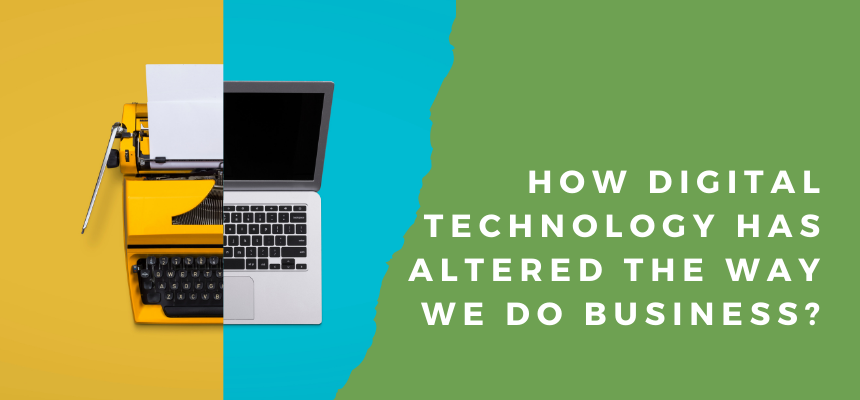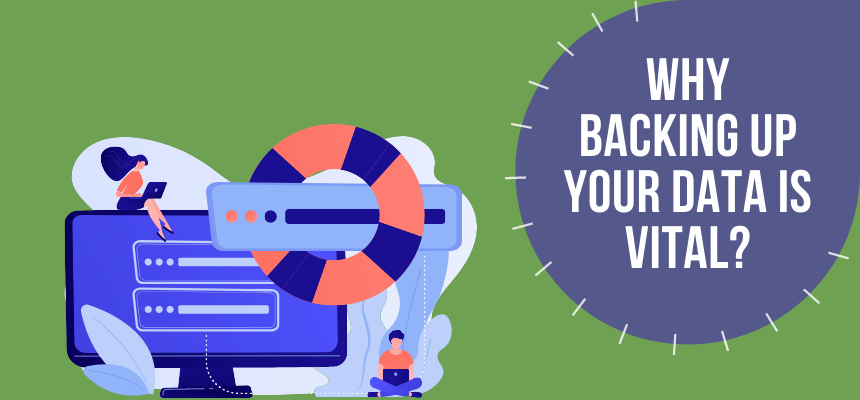How Digital Technology Has Altered the Way We Do Business
Banking History
Banking dates back in a recognizable form to the late 13th century. Even then, there were International Merchant Banks set up to facilitate the transfer of funds in order to trade around the world.
These institutions remained fundamentally unchanged for centuries other than growing in number and increasing the types of service they provided. It wasn’t until the late 20th and early 21st century that anything genuinely new happened, this came along with the incredible speed with which digital technologies were growing.
Enter – The Internet
The invention of the World Wide Web, or the internet as we call it today, began in the mid-1990s. It was a user-friendly network designed for sharing information. In its first fifteen years, it revolutionized business, changed communications, and fueled economic growth worldwide.
By the time Microsoft invented Internet Explorer, the demand for easy-to-use Internet browsers lead to the appearance of others such as AOL (America Online), CompuServe, and Netcom.
It wasn’t until the early 2000s that millions of businesses and homes were connected to the internet 24hours a day via broadband.
This digital technology has continued to evolve, along with others that are connected to it, such as the advances in hardware, including increasingly more powerful computers and mobile devices - laptops, tablets, phones, and even watches. All of this digital technology has altered the way we do business now and will continue to do so in the future.
Home Working
Before the internet, it would have been simply unimaginable for most people to work from home. Now our online connection allows us to communicate using email or via text, voice, or face to face message, using messaging software. The increasing need for businesses and other groups of people to hold remote meetings has caused a surge in the number of programs designed to facilitate this. Zoom, Microsoft Teams, Slack, Skype, and many others. These all allow us not only to see one another as we talk but to share documents and record meetings, making it possible to review what was said, by who, when, and in what context. This makes it a very useful business tool.
The Covid-19 crisis has had a dramatic impact on the number and people working from home. Many have found this new way of telecommuting far better than the stresses and strains of going into an office every day. For this reason, and because employers have discovered that their workforce has increased rather than decreased their productivity, home working is now seen as a hugely positive thing. Not to mention that getting rid of a physical office space can save a business an enormous amount of money each year.
It is true to say that if Covid-19 happened before there was the internet, things would surely be very different.
Keeping Up
Using the latest technologies allows businesses to stay ahead, or at least keep up with their competitors. Everything today is about having the things we want now, and this translates to the world of work. Employers expect results of the highest quality and in the shortest possible times from their employees.
Arguably one of the most significant downsides to the speed by which technology changes, is the difficulty in keeping up. It seems as soon as you’ve implemented one thing, something newer takes its place. This can be problematic for businesses on two fronts - the expense of upgrading both hardware and software and the training of personnel to use it.
We are in what is referred to as - the fourth industrial revolution. Mechanization being the first, when we found how to harness the power of water and steam to drive great machines to speed up and simplify what had until then been manual processes. Next, electricity allowed us to develop assembly lines, and factories could turn out vast numbers of their products. The third revolution was automation, with the invention of robots that could work on an assembly line without the need for human interaction. Now we have the fourth, which works to combine some of the processes of previous industrial revolutions but adds extra elements, including artificial intelligence, where machines can actually think for themselves, making recommendations to people.
IT Support
A new role has sprung up in businesses of all sizes, that of IT support. It could be a single person or an entire team whose job is to keep everything running smoothly. They are challenged daily by criminal activity that targets cyber technologies and the need to keep up with the latest legal legislation, software updates, hardware, and the best systems for the company they work for. Businesses rely heavily on their skills and for good reason.
The IoT or Internet of Things
We often take it for granted, but today the internet is everywhere. Smart devices, from lightbulbs to our central heating system, all use the internet to function. We are literally connected everywhere as these devices send and receive data in order to perform the functions we require of them.
The ever-growing number of everyday objects being brought to life is astonishing, and it must be remembered that these devices require a whole infrastructure behind them. The device itself, the software it uses, the secure storage of data it produces, the programming that permits it to function simply for the end-user, and so on. All of this has created the need for people skilled in these areas and is a market enjoying a booming increase at a truly supersonic rate.
Within the workplace, smart devices are finding increasing popularity. It allows employees to stay comfortable and work more efficiently while the devices themselves can be managed remotely by employers.
Digital Payments
With the development of online banking, it’s possible to make immediate purchases, receive payments or move multiple currencies freely around the world. You don't even need to have a bank account in that currency. This form of digital technology has altered the way we do business and simplified banking processes, saving us time and reducing costs.
Payments for goods and services can be made digitally using a smartphone instead of a credit or debit card. Apple Pay even lets you do the same thing with an Apple Watch. The manufacturers say this is more secure than using a card because the devices don’t hold any of your payment details, they simply facilitate the transaction. If someone was to steal your phone or Apple Watch, they would still not be able to use them to make purchases, as they require security measures need to be passed.
It used to be difficult for small and mobile businesses to take credit and debit card payments due to transaction and equipment costs. With the invention of small mobile card devices such as SumUp, Zettle, and Square, these businesses can now collect payments more cheaply and easily than ever.
There has also been a surge in the number of companies facilitating online transactions, such as PayPal, Stripe, WorldPay, and Wise. They are not banks but simply provide a service that makes it easy to move money between accounts. These types of services usually offer almost instant verification of the funds movement, making sales and purchases quick and efficient. This has allowed businesses to not only make sales of their goods and services easy online but also lets them pay their independent workers, wherever they are located in the world.
As the world of cryptocurrency grows, it is almost certain that it will soon have a larger part to play in our day-to-day transactions. Blockchain has been used by a growing number of banking organizations to increase the speeds and security by which transactions can be done. However, they are rather slower at passing these benefits on to their customers. In the future, this will hopefully change and traditional banks will begin to compete with online ones.
Accounting
Along with the ability to accept and make payments digitally, you can now keep all of your business accounts online too. Akaunting is an excellent example of this. It provides business owners a platform they can use to manage and maintain all of their accounting needs. It cleverly adapts to all types of business with the addition of bolt-on apps that offer a vast range of extra services. One of the best parts about Akaunting’s product is that the basic package is completely free.
In the Cloud
There was, not so long ago, the need for businesses to maintain their digital records using computers with extensive amounts of memory and giant hardware servers, which were either on-site or provided at significant cost by a third-party service remotely.
With the invention of cloud data storage, it is now possible to benefit from simple software that facilitates the keeping of our digital records in a data cloud, off-site. The providers of cloud storage sell chunks of storage to users at low prices.
Cloud storage has the advantage of allowing anyone with authorization to access the information. This lets remote employees work seamlessly with the company wherever they are based in the world.
The advantage of this is that it widens the talent pool companies have to pick from. It allows them to recruit globally and not just in their local vicinity.
Gaming
Year on year, gaming is increasing its revenue over movies and sport combined. The growth in the gaming market is set to continue, although for now it is in part fuelled by Covid-19 and the number of time people has spent at home with time on their hands.
The eSports market has been valued at around 1.08 billion USD in 2021. This is set to rise to an estimated 1.62 billion by 2024.
Businesses that are enjoying these revenues include not only the makers of the games themselves but advertisers, sponsors, publishers, merchandisers, and streaming platforms. This area of digital technology is hot property right now.
Security
One of the most significant concerns with the advances in technology is security. Cybercrime is an ever-present and ever-growing threat to any business that uses online technology. Using cloud storage, digital banking, IoT devices, email, and so on can leave a company open to attack. Hackers are constantly looking for new ways to access your valuable data.
Ironically should you become a victim of cybercrime, YOU could be fined for allowing a data breach.
As criminals find new and ever more ingenious methods to access your sensitive data, so cyber-security continues to evolve. It is essential for businesses to keep up with these changes to protect themselves and their clients.
Human Resources
Business is no longer local. Today even small enterprises can access global markets. An additional benefit is being able to recruit the very best candidates for a job, no matter where they are in the world.
Specialist software has been developed to help HR departments select the best candidates. It does this by filtering the applicants with regard to set requirements that are input into it. This could be a particular skill set, qualifications, years in the role, and so on, saving hours, if not days, of sifting through often 100’s of applications by hand.
Online freelancing platforms such as Upwork, Freelancer, and Fiver can also help HR managers outsource work to qualified individuals, at highly competitive rates.
The Growth in Digital Products
One business area that has seen a huge boom in sales is digital products. Many people have recognized the demand for digital items and have cashed in. Artists and graphic designers can offer their work as printables for their clients to print off at home. Writers or people with authority in any given subject are writing e-books. Even regular authors are now selling in digital mediums, and audiobooks have become increasingly popular. Many businesses offer e-books for training purposes, and the growth in online courses has been enormous, partly fueled by the Covid-19 crisis. This is due to the need for many to find alternative employment they can do from home or that isn’t affected by Covid restrictions.
Artificial Intelligence (AI)
Artificial intelligence has started to impact many sectors, medical, charitable, industrial it is even in our homes. We’re not quite ready for intelligent humanoid robots yet, but tech like Apple’s Siri, Amazon’s Alexa, and Google’s Home is already a part of our lives. The likelihood is that this type of technology will soon become part of our everyday work environment too.
Getting Social
Social media has also become a part of many businesses. It’s a powerful marketing tool that most companies simply cannot afford to overlook. It allows them to target a very specific demographic, getting their products and services in front of a niche audience, one that is far more likely to buy what they are offering. It also allows for split testing and maintaining a budget that can be carefully controlled. This can be flexed up and down as required and increased only once the advertising sweet spot has been found, making it more financially efficient.
Conclusion
There is no denying that digital technology has altered the way we do business in the world today. Our need for speed, with everything, demanded now, increases our reliance on this tech and will only raise the demand for new innovations in the future.
As incredible as these advances are, the implications for the security of data, both personal and financial, are still a concern. It is, however, essential in order for businesses to thrive, that they keep up with the technological advancements to stay competitive.
Technology has, for the most part, made our lives more convenient. Still, it has also created many new jobs and altered the way we do business forever.






Comments